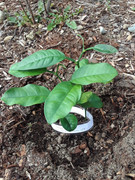1251
Temperate Fruit Discussion / Re: Strange Royal Lee Cherry behavior
« on: March 23, 2018, 02:28:01 PM »
Haha, not likely. Those aren't even closely related.
The Internet's Finest Tropical Fruit Discussion Forum!
"All discussion content within the forum reflects the views of the individual participants and does not necessarily represent the views held by the Tropical Fruit Forum as an organization."
This section allows you to view all posts made by this member. Note that you can only see posts made in areas you currently have access to.
In this paper of DNA analysis the spelling is kabuchi ,not kubachiMy apologies, it is indeed spelled kabuchi.
In one DNA study I read, that kabuchi is kunenbo x citrus yatsushiro in another kunenbo x something like citrus depressa.That would be interesting, so it appears keraji is a triple backcross of kunenbo with some other original citrus. Probably some sour citrus I am guessing, maybe Yuzu.
Kabuchi is chance seedling from Okinawa.
What is kubachi?Apparently a rare obscure citrus that is very specific to a particular region in Japan.
so do you think my assuming that Yuzu/Pink Eureka Lemon might be a good rootstock would work?I wouldn't necessarily make that jump. Lemons show different rootstock compatibility than mandarins and oranges.
Even though California isn't thought to have the heat to produce high quality grapefruit, I've always wanted to try a Duncan and let it hang on the tree for as long as possible.I don't think that's true, or at least mostly not true. Hotter inland areas (like Riverside) have plenty of heat. Even areas that are marginally close to the coast in Southern California are not too bad. Might not be completely optimal but the fruits will still get enough heat to be decently good (certainly okay tasting at least).
